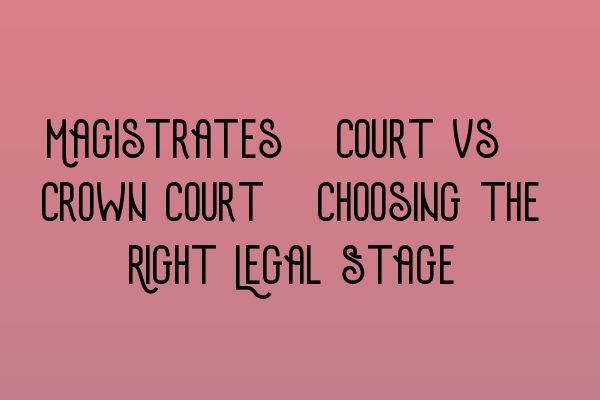Magistrates’ Court vs. Crown Court: Choosing the Right Legal Stage
When facing criminal charges in the UK, understanding the different legal stages can be crucial to obtaining a favorable outcome. Two common stages in the criminal justice system are the Magistrates’ Court and the Crown Court. Each stage has its own unique characteristics and processes, and it’s important to choose the right legal stage for your case. In this blog post, we will explore the differences between the Magistrates’ Court and the Crown Court, enabling you to make an informed decision about which legal stage is best for your circumstances.
The Magistrates’ Court
The Magistrates’ Court is typically the first legal stage that criminal cases go through. This court handles the majority of criminal cases in the UK, such as minor offenses, road traffic offenses, and preliminary hearings for more serious cases. The Magistrates’ Court is presided over by magistrates, who are trained volunteers with legal knowledge, but they are not qualified solicitors or barristers.
One of the key advantages of the Magistrates’ Court is its speed. Cases are usually heard quickly, which means you can resolve your legal matter in a timely manner. Additionally, the Magistrates’ Court is less formal compared to the Crown Court, which can provide a less intimidating atmosphere for defendants.
However, it’s important to note that the Magistrates’ Court has limited sentencing powers. They can only impose lower-level punishments, such as fines, community service orders, and short prison sentences of up to six months. For more serious offenses, the case may need to be transferred to the Crown Court.
The Crown Court
The Crown Court deals with more serious criminal cases, such as murder, rape, robbery, and complex fraud. Unlike the Magistrates’ Court, the Crown Court is presided over by a judge and a jury. The judge ensures a fair trial and decides on points of law, while the jury determines the defendant’s guilt or innocence.
The Crown Court offers a more formal setting, with legal professionals presenting cases and cross-examining witnesses. The process tends to be more complex and thorough compared to the Magistrates’ Court. Additionally, the Crown Court has wider sentencing powers, including longer prison sentences and stricter penalties.
Choosing the Crown Court can be beneficial if you believe you have a strong case and want the opportunity to present your evidence in a comprehensive manner. It can also be the right choice if you believe the severity of your charges calls for a sterner punishment should you be found guilty.
How to Choose the Right Legal Stage
Deciding whether to proceed with your case in the Magistrates’ Court or the Crown Court requires careful consideration. Here are a few factors to help you make an informed decision:
- Nature and severity of the offense: If you are charged with a minor offense or a less serious crime, the Magistrates’ Court may be the appropriate choice. For more serious offenses, the Crown Court is likely the better option.
- Desired outcome: Consider what outcome you hope to achieve from your case. If you are primarily seeking a swift resolution or a more lenient sentence, the Magistrates’ Court may be suitable. If you want a thorough trial with the possibility of a more severe punishment for the guilty party, the Crown Court may be the right fit.
- Evidence and legal representation: Assess the strength of your evidence and consult with legal professionals for advice. They can help evaluate the strength of your case and guide you on the appropriate legal stage.
Ultimately, your decision should be based on what will give you the best chance of achieving a favorable outcome for your case.
At SQE Criminal Law & Practice Law UK, we understand the importance of choosing the right legal stage for your case. Our team of experienced solicitors can guide you through the complex legal system and provide expert advice tailored to your situation. Contact us today for a consultation and let us help you navigate the intricacies of the Magistrates’ Court and the Crown Court.
Related Articles:
